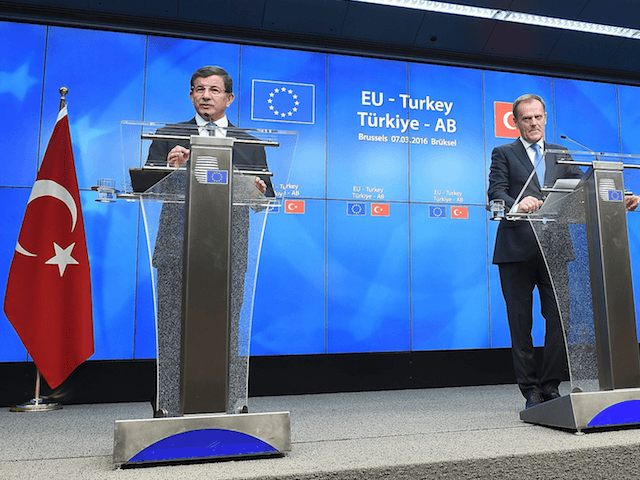(Reuters) – EU officials are racing to overcome legal concerns on human rights and tensions between Turkey and Cyprus in order to complete a deal they hope can stem the migrant crisis when leaders meet later this week.
At a summit a week ago, EU leaders gave broad assent to an accord sprung on them by Turkish Prime Minister Ahmet Davutoglu and German Chancellor Angela Merkel whereby all migrants reaching Greece would be deported back to Turkey in return for places for Syrian refugees in Europe and for EU financial help for Ankara.
Following criticism from the United Nations and other human rights bodies, as well as many European politicians, EU lawyers are working to ensure the plan can be presented as conforming to international law, diplomats and officials said on Monday.
European Council President Donald Tusk, who will chair the EU summit on Thursday and EU meeting with Davutoglu on Friday, was flying to Cyprus for talks on Tuesday with President Nicos Anastasiades, seeking to avoid an effective Cypriot veto.
Cyprus, ethnically split between Greek and Turkish Cypriots, is represented in the EU by its internationally recognised Greek Cypriot government and has blocked Turkey’s own efforts to join the EU. Peace talks to reunite the island are now underway.
Many EU leaders have been irritated by the way Davutogulu and Merkel presented their migrant deal, though most have broadly welcomed it. Tusk hopes to draft a “rebalanced” EU-Turkey plan by Wednesday.
“The balance here is not right,” a diplomat from one member state said on Monday. “People … want to push back.”
Negotiators are seeking legal moves from Turkey to ensure that EU states can consider its treatment of asylum seekers as being in line with international standards, officials said.
From Greece, Brussels is seeking assurances that it will provide facilities on its islands off the Turkish coast to ensure that every person arriving can have a hearing, including an individual judicial appeal, against deportation to Turkey.
On Monday, the human rights commissioner of the Council of Europe echoed a senior U.N. official in warning of illegal mass expulsions. He urged the EU to scrap the proposals with Turkey.
CYPRUS QUESTION
A second major obstacle to the deal, whereby the EU would take in directly from Turkey one Syrian refugee for every Syrian deported back from Greece, is the decades-old Cyprus issue.
Turkey wants its citizens to have visa-free access to Europe by June and to open new “chapters” of its long-stalled talks on it joining the EU. However, both of those will require the consent of Cyprus, which is seeking concessions in return.
Cyprus blocked parts of Turkey’s accession process a decade ago when Ankara refused to open its ports to Cypriot shipping.
EU leaders are also concerned not to derail negotiations on the reunification of the island’s Turkish-backed north with the Greek-speaking south. Hopes are high that U.N.-brokered talks could bring a deal in the next year or so and some EU officials see an opportunity to advance a Cyprus-Turkey rapprochement.
Leaders are likely to spell out that the number of refugees to be resettled in the EU will be limited to some 70,000, within the terms of existing EU schemes for taking asylum seekers. In fact, EU officials see many fewer refugees to be involved in the one-for-one deportation and resettlement programme, since the intent is to deter such large numbers of people reaching Greece.
If it fails to stop them, the plan will be impracticable, EU officials say. If it does work, EU governments will explore further possibilities to take in refugees directly from Turkey.
A draft EU communique seen by Reuters showed that EU leaders will also reaffirm help for Greece, including taking in more asylum seekers stranded by border closures in the Balkans. They will also warn against new migration routes being opened up.

COMMENTS
Please let us know if you're having issues with commenting.